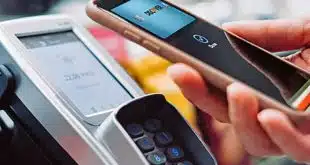Samsung Pay, the mobile wallet that uses near-field communication (NFC) and magnetic secure transmission (MST) technology, is developing a set of simple tools merchants can use to create offers and manage loyalty programs. The tools should be available this year.
That’s the word from Will Graylin, global co-general manager of Samsung Electronics Co. Ltd.’s Samsung Pay, who spoke at the annual Northeast Acquirers Association conference in Boston on Thursday. Graylin, who sold LoopPay Inc., which developed MST, to Samsung in 2015, also says Samsung is creating a reseller program. The inclusion of MST means many point-of-sale terminals that just have a magnetic-stripe reader can accept Samsung Pay transactions.
Samsung Pay, which launched almost four months ago, is preparing to evolve into a commerce-enabled app, Graylin tells Digital Transactions News.
The new merchant tools, which Graylin says will be available in 2016 without offering a more specific timeframe, will encompass promotional services such as marketing and loyalty. Samsung is “working on the promotional tools, the [customer relationship management] tools for the merchant to be able to use these tools for offers right into the digital wallet that the consumer can use right at the point of sale,” Graylin says. “We see that as a powerful channel.”
Merchants will pay a fee for these services, though how much is unknown, which is how Samsung will make money from Samsung Pay, Graylin says. Competitor Apple Inc. charges issuers 15 basis points per transaction on credit and debit cards loaded into Apple Pay wallets. Graylin says Samsung Pay does not assess fees like that. Apple’s 15 basis points are not sustainable in the long run, Graylin says.
“If you can tell your merchants I can help increase your sales, help find new customers and more customers, help you keep your customers loyal through a new digital channel and format, would they be interested?” Graylin quizzed attendees.
The reseller program, targeting independent sales organizations and acquirers, is in the early stages of development. Two Samsung Pay employees roamed the acquirer event hoping to recruit prospective resellers.
Samsung is looking beyond face-to-face payments for its wallet, too. “It’s not good enough to focus on just physical payments,” Graylin says. “The account has to work in the online environment itself.” How a Samsung Pay transaction is tokenized for an online payment is as important as in the physical arena. Contactless Samsung Pay transactions, whether completed via NFC or MST, are tokenized, Graylin says.
He also expects that card penetration for Samsung Pay will reach more than 80% of the U.S. credit card base by the end of 2016. Currently, 39 issuers, according to the Samsung Pay Web site, support the mobile payment protocol.
Samsung Pay’s impending moves could prove positive for the nascent digital wallet, says Nick Holland, an independent research analyst specializing in mobile payments.
“From a Samsung Pay perspective, it’s a very positive move,” Holland tells Digital Transactions News. “It’s creating awareness of their products and puts them ahead of the game.” That’s especially important, he says, because other digital wallets—Apple Pay and Android Pay—don’t really court merchants.
Providing merchants with tools to engender consumer loyalty is very important, Holland says, because the most significant competition for Samsung Pay, Apple Pay, and Android, Pay, the mobile wallet from Alphabet Inc.’s Google unit, is the physical wallet consumers carry. Just replicating the payment function of that wallet is not enough to get consumers to adopt new habits, but offering value-added services can, Holland says. “You’re looking to break very entrenched habits.”
Similarly, Holland regards the creation of a reseller program as a positive move. “To my knowledge, their competitors aren’t doing anything active in that (area),” he says.
Graylin also says Samsung Pay technology will appear in more devices in 2016. Samsung announced last week that its upcoming Gear S2 smart watches will offer NFC-enabled Samsung Pay. The service could end up in other accessories, Graylin says, such as a low-cost fob a bank could provide free to consumers. “We are not stopping at just our phones,” he says, though he declines to provide details.
Moving beyond Samsung-only devices for Samsung Pay is essential, Holland says. “I have always considered Samsung Pay to inherently have a problem if it remains only on Samsung devices,” he says. “Ultimately, there has to be an open sourcing of platforms, which means potentially getting into relationships with sources [Samsung] otherwise might not want to.”





